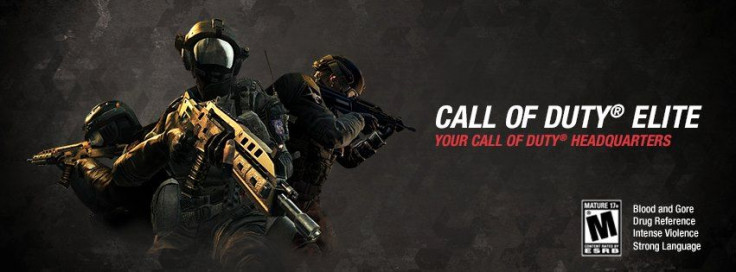'Call Of Duty Elite' For Black Ops 2: Why Activision Is Finally Accepting Freemium Services
CEO Says That Freemium Will Help Unite Users Into Single Community

Activision Blizzard Inc. (Nasdaq: ATVI) is switching away from its successful “Call of Duty Elite” service for the release of its highly-anticipated “Black Ops II” title next month. The Santa Monica-based gaming juggernaut, which broke entertainment industry records last year and the year before with its last two “Call of Duty” titles, will instead offer the “Call of Duty Elite” service for free to all users and charge for individual content packages following the initial release.
COD Elite was first launched with “Modern Warfare 3” in 2011 as a paid subscription. For a $49.99 yearly fee, users would get access to additional social networking and management features that tracked their performance and facilitated the game’s general spirit of ferocious, sports-like online competition. But more importantly, in terms of content development, the Elite service also offered its users discounted downloadable content (DLC), such as new map packs and items for the virtual soldiers, which were rolled out on a monthly basis.
Activision CEO Eric Hirshberg, for his part, has been wary in the past of what he sees as the video game industry's heedless rush into the "next big thing," free-to-play gaming being a big part of that today. And thanks to his company's unprecendented success with franchises like "Call of Duty" and more recently "Skylanders," Hirshberg hasn't had to experiment with the sorts of digital-friendly publishing models that many of Activision's competitors have adopted.
Until now. With the changes for “Black Ops 2,” all “Call of Duty” players will receive the networking features for free with the game. But downloadable content will not come as part of the Elite package, instead being sold separate either in four individual map packs for $15 each, or for $49.99 as a bundle called the “Black Ops II Season Pass.”
The new downloadable content, in total, therefore costs just as much, if not more, to the average “Call of Duty” customer. The only problem with the pre-existing COD Elite model was thus that it bifurcated users between the “casual” players who weren’t sure if they wanted to put forward another investment that was almost as expensive as the game itself ($59.99 at the time of release) and those willing to spend over $100 on a single game up-front.
In a statement announcing the switch in its digital distribution and business strategy, Activision was quick to maintain that it will still be offering the Elite service in a relatively unchanged form. The hope in transitioning to freemium model thus seems to be an attempt to attract a wider swath of Activision’s already impressive number of loyal “Call of Duty” customers.
"We've learned a lot in our first year of Call of Duty Elite, and we're very proud that we over delivered on our commitment of playable content to our premium members," Hirshberg said in the statement. "What we have realized is that several of the Call of Duty Elite services which are currently only available to our premium members for Call of Duty: Modern Warfare 3 are things that would further unite, engage and delight our player community. So we are going to make them free for 'Call of Duty: Black Ops II.'"
Speaking to VentureBeat, Hirshberg noted that Activision has already proven that “people are willing to pay for services if those services are compelling.” Since its launch last year, COD Elite has already managed to net more than 2.3 million users from the pool of “Call of Duty” customers that bought the traditional retail product already.
The allure of the freemium marketplace is clear, even to companies that continue to be as successful as Activision with traditional physical retail publishing models. By eliminating psychological barriers, publishers can attract audiences that make any premium product’s user base pale in comparison. Over half of the European marketplace is now dominated by freemium games for this reason alone.
Yet as we have previously shown in our coverage of freemium markets, free-to-play products face a particular challenge of retaining user engagement and thereby monetizing a significant chunk of their consumers.
With “Call of Duty,” Activision doesn’t have this problem since the interest itself is self-evident with the initial purchase. So at this point, it seems as though the company has nowhere to go but up.
Activision advised in its statement that current COD Elite subscribers will continue to receive the premium features of the service for “Modern Warfare 3,” but that their paid subscriptions will have no impact on “Black Ops II.”
© Copyright IBTimes 2025. All rights reserved.






















